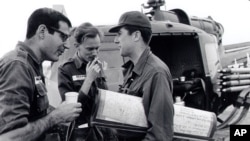A few days ago, George Lewis sat on a hotel rooftop overlooking bustling Ho Chi Minh City. Forty years ago, he spent evenings at the Caravelle hotel just down the street.
With other foreign correspondents in the 1970s, Lewis watched as soldiers battled in the distance, their weapons sending explosions of light through the air. As a journalist for NBC News, he relayed to the American public what was happening in the Vietnam War.
“TV became a prime source for people,” Lewis said, “because they could see with their own eyes what was going on.”
Lewis has joined dozens of retired journalists now back in Vietnam for a reunion 40 years after the war here ended. The country is usually associated with press restrictions, yet Vietnam has rolled out the red carpet for these former war reporters.
The communist government has a generally favorable view of foreigners who covered the Vietnam War. Their coverage helped to weaken U.S. public and political support for the war half a century ago.
Today, the same foreigners could help Vietnam again, if their reunion shows that the Vietnamese are friendly hosts who embrace outsiders. To that end, the Vietnamese government organized and paid for much of the event to mark the end of the war.
“They don’t want to be seen as some kind of pariah state,” said Stewart Dalby, who is from Britain and reported for the Financial Times in Vietnam from 1971 to 1975. “Like anyone else, they care about PR.”
Lewis agreed that Vietnam wants good relationships with the former correspondents.
“They want us to go back and portray a positive image of Vietnam,” said Lewis, who is from Los Angeles.
A pivotal war for journalists
Vietnam was a formative war for these foreign correspondents, many of whom made a name for themselves in what was then a little known Southeast Asian country to many westerners. Peter Arnett picked up a Pulitzer for his reporting, Nick Ut for his photography. Tim Page left a mark in Ho Chi Minh City by helping to create an exhibit of war photographs still housed at the War Remnants Museum.
All were on hand for this week’s reunion of self-described “Old Hacks.” Officials in Ho Chi Minh City planned much of the foreign journalists’ reunion, introducing them to Vietnamese war veterans and busing them out to the Cu Chi tunnels once used by communist soldiers.
While catching up over drinks Wednesday night, some former reporters said they came to Vietnam already believing the United States shouldn’t have gone there to fight a war. Their reporting in those days marked a turning point for journalism. Media reports defied the U.S. military’s narrative that it was winning the war. The improved technology at the time allowed journalists to show the conflict to audiences back home in graphic detail.
“I think the fact that they were watching a color war - they weren’t watching a black and white movie - it’s more real,” said Barry Fox, who came from Ireland and worked for ABC News.
Many returnees recalled witnessing the U.S. evacuation on April 29, 1975, as well as the communist takeover of Saigon the next day. Dalby described scenes of South Vietnamese soldiers discarding their uniforms to avoid capture as defeat looked imminent. Children were hauling off looted goods in wheelbarrows, and foreign reporters were wondering if they should go to work.
American photographer Matthew Naythons arrived just in time to see the war end. Naythons, who went on to document conflicts from Central America to South Asia, said he opposed the Vietnam War but admitted it was an adventure for him.
“It’s a dirty secret of being a war correspondent,” he said. “It’s exhilarating. If you survive.”







